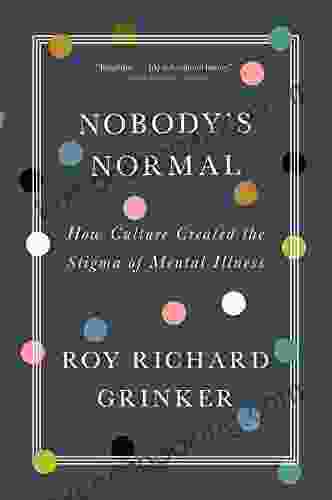How Culture Created the Stigma of Mental Illness: Unraveling Societal Biases and Fostering Compassion

Mental illness, a complex and multifaceted aspect of human experience, has long been shrouded in stigma and misunderstanding. This stigma has profound consequences, deterring individuals from seeking help, perpetuating isolation, and fostering discrimination. To effectively address this pressing issue, it is imperative to delve into the cultural roots that have shaped societal attitudes towards mental health.
4.7 out of 5
| Language | : | English |
| File size | : | 1159 KB |
| Text-to-Speech | : | Enabled |
| Screen Reader | : | Supported |
| Enhanced typesetting | : | Enabled |
| X-Ray | : | Enabled |
| Word Wise | : | Enabled |
| Print length | : | 435 pages |
Historical Perspectives: The Roots of Stigma
The stigma surrounding mental illness has deep historical roots. In ancient Greece, individuals with mental disFree Downloads were often considered possessed by spirits or suffering from divine punishment. During the Middle Ages, they were subjected to cruel and inhumane treatment, including confinement in dungeons or asylums. The Enlightenment period brought some progress, with the emergence of medical models that viewed mental illness as a treatable condition. However, stigma persisted, fueled by societal fears and prejudices.
Cultural Variations: The Influence of Societal Norms
The stigma of mental illness varies significantly across cultures. In some societies, mental health conditions are openly discussed and individuals are supported in seeking help. In others, there is a strong emphasis on conformity and mental illness is seen as a shameful secret. Cultural factors such as religious beliefs, social values, and family structures play a significant role in shaping these attitudes.
Psychological Factors: Fear, Misconceptions, and Lack of Understanding
Psychological factors also contribute to the stigma of mental illness. Fear of the unknown, misconceptions about the causes and symptoms of mental disFree Downloads, and a lack of understanding can lead to avoidance and discrimination. The media often perpetuates negative stereotypes, portraying individuals with mental illness as dangerous or unstable. This can further reinforce the stigma and discourage people from seeking professional help.
The Impact of Stigma
The stigma of mental illness has far-reaching consequences for individuals and society as a whole. It creates barriers to accessing healthcare, employment, and education. It can lead to social isolation, discrimination, and even violence. Stigma also prevents individuals from seeking help when they need it, which can have devastating effects on their well-being and recovery.
Breaking the Stigma: Strategies for a More Compassionate Society
Breaking the stigma of mental illness requires a multifaceted approach, involving education, advocacy, and policy changes. By raising awareness and promoting accurate information about mental health, we can challenge misconceptions and reduce fear. Advocacy efforts can focus on changing discriminatory laws and practices, ensuring equal access to care and support services.
At the individual level, we can all play a role in fostering a more compassionate and inclusive society. By being open and accepting of individuals with mental illness, we can create a supportive environment where they feel safe and valued. We can also challenge negative stereotypes and speak out against discrimination.
The stigma surrounding mental illness is a complex and pervasive issue with deep cultural roots. By understanding the historical, societal, and psychological factors that have shaped this stigma, we can develop effective strategies to break it down. Through education, advocacy, and individual actions, we can create a society where individuals with mental illness are treated with dignity, respect, and compassion.
Embracing a more inclusive and compassionate approach to mental health not only benefits those directly affected by it but also our entire society. By fostering a culture where individuals can seek help without fear or shame, we create a healthier and more just world for all.
4.7 out of 5
| Language | : | English |
| File size | : | 1159 KB |
| Text-to-Speech | : | Enabled |
| Screen Reader | : | Supported |
| Enhanced typesetting | : | Enabled |
| X-Ray | : | Enabled |
| Word Wise | : | Enabled |
| Print length | : | 435 pages |
Do you want to contribute by writing guest posts on this blog?
Please contact us and send us a resume of previous articles that you have written.
 Book
Book Novel
Novel Page
Page Chapter
Chapter Text
Text Story
Story Genre
Genre Reader
Reader Library
Library Paperback
Paperback E-book
E-book Magazine
Magazine Newspaper
Newspaper Paragraph
Paragraph Sentence
Sentence Bookmark
Bookmark Shelf
Shelf Glossary
Glossary Bibliography
Bibliography Foreword
Foreword Preface
Preface Synopsis
Synopsis Annotation
Annotation Footnote
Footnote Manuscript
Manuscript Scroll
Scroll Codex
Codex Tome
Tome Bestseller
Bestseller Classics
Classics Library card
Library card Narrative
Narrative Biography
Biography Autobiography
Autobiography Memoir
Memoir Reference
Reference Encyclopedia
Encyclopedia Mark Zondo
Mark Zondo Tod E Bolsinger
Tod E Bolsinger Maureen Mccormick
Maureen Mccormick Mari Mancusi
Mari Mancusi Haley Fox
Haley Fox Phuoc Thi Minh Tran
Phuoc Thi Minh Tran Marjorie Lambert
Marjorie Lambert Marlynn Jayme Schotland
Marlynn Jayme Schotland Tobias Wolff
Tobias Wolff Steven C Dinero
Steven C Dinero Melissa Washburn
Melissa Washburn Mary Lou Danielson
Mary Lou Danielson Merrie Destefano
Merrie Destefano Mary Losure
Mary Losure Mary Childs
Mary Childs Matteo Rizzato
Matteo Rizzato Rumiko Takahashi
Rumiko Takahashi Mark Parman
Mark Parman Yoann Blanquart
Yoann Blanquart Mario Casciaro
Mario Casciaro
Light bulbAdvertise smarter! Our strategic ad space ensures maximum exposure. Reserve your spot today!
 Bryson HayesFollow ·19.2k
Bryson HayesFollow ·19.2k Forrest ReedFollow ·11.7k
Forrest ReedFollow ·11.7k Holden BellFollow ·3.7k
Holden BellFollow ·3.7k Isaac AsimovFollow ·10.6k
Isaac AsimovFollow ·10.6k Haruki MurakamiFollow ·3.3k
Haruki MurakamiFollow ·3.3k Richard AdamsFollow ·19.1k
Richard AdamsFollow ·19.1k Jesse BellFollow ·13.4k
Jesse BellFollow ·13.4k Tim ReedFollow ·9.7k
Tim ReedFollow ·9.7k

 Larry Reed
Larry ReedGwendy's Final Task: A Thrilling Conclusion to a Timeless...
Prepare to be...

 Victor Turner
Victor TurnerHow FDR Defied Polio to Win the Presidency
Franklin D. Roosevelt is...

 Edwin Cox
Edwin CoxWinner RGS BBC Journey of a Lifetime Award: An Inspiring...
In the heart of the world's...

 Griffin Mitchell
Griffin MitchellEverything You Need to Know, You Learned From Mister...
Mister Rogers' Neighborhood was a beloved...

 Beau Carter
Beau CarterSeasons of Terror: A Spine-Tingling Odyssey into the...
In the realm of horror...
4.7 out of 5
| Language | : | English |
| File size | : | 1159 KB |
| Text-to-Speech | : | Enabled |
| Screen Reader | : | Supported |
| Enhanced typesetting | : | Enabled |
| X-Ray | : | Enabled |
| Word Wise | : | Enabled |
| Print length | : | 435 pages |














